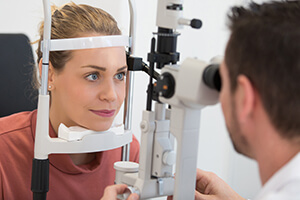Comprehensive Eye Care
Why Are Eye Exams Important?
By age 65, 1-in-3 Americans have some form of vision-impairing eye disease. Most however do not know it because often there’s no warning symptoms or they assume that poor sight is a natural part of growing older. By detecting and treating eye disease early through annual, dilated eye exams, seniors can preserve their sight.
Two common eye diseases affecting seniors are Cataracts and Glaucoma, to learn more select a link below.
Eye Exams in Bellevue
Comprehensive eye examinations are very important not only to determine if you need correction to see well, but also to maintain the health of your eye.
While some eye diseases have obvious symptoms such as red eyes, light sensitivity, or flashing lights, many serious, vision-threatening problems have no warning signs. Glaucoma, for example, will present no symptoms until actual vision loss occurs. Proper eye care and evaluations can help prevent vision loss. Comprehensive eye exams can also detect diabetes, hypertension, retinal holes or tears, and other important treatable medical conditions.
 A comprehensive eye examination at Specialty Eye Care Centre involves a series of tests designed to evaluate your vision and check for eye diseases. Each test is necessary and allows your doctor to evaluate a different aspect of your vision.
A comprehensive eye examination at Specialty Eye Care Centre involves a series of tests designed to evaluate your vision and check for eye diseases. Each test is necessary and allows your doctor to evaluate a different aspect of your vision.
Common Eye Exam Tests Include:
- External Eye Exam: Your doctor will check of your eyes using a light to ensure the exterior parts of your eyes are functioning correctly. In an external eye exam, your eye doctor checks: Your pupils to see if they respond normally, position and movement of your eyes, eyelids and lashes, your cornea and iris for clarity.
- Eye Muscle Test: This test examines your eye muscles to ensure they’re functioning properly. Your eye doctor looks at your eyes as they move in six specific directions. Your doctor will ask you to sit still and look forward, using your eyes to follow an object, such as a pen. The eye muscle test is designed to detect any weaknesses or uncontrolled movements in the muscles that move your eyes up and down and side to side.
- Visual Acuity Test: This test measures how sharply or clearly you can see something at a distance. Your doctor will ask you to identify different letters of the alphabet off a chart positioned usually 20 feet away. The lines of type get smaller as you move down the chart. You cover one eye and read aloud, then cover the other eye and read aloud. Your doctor monitors how well you can identify the letters. Your visual acuity is expressed in a fraction – such as 20/20 vision. The top number refers to your distance from the eye chart, usually 20 feet. The bottom number indicates the distance at which a person with normal eyesight could correctly read the line you read. For example, 20/20 vision means that you can see objects clearly from 20 feet away that a person with normal vision could see clearly from 20 feet away.
- Refraction Assessment: Refraction refers to how light waves are bent as they pass through your cornea and lens. A refraction assessment helps your doctor determine a corrective lens prescription that will give you the sharpest vision. Your doctor will have you look through a phoropter, a devise that holds many lenses, and determine which combination of lenses gives you the sharpest vision.
- Visual Field Test: Your doctor my request you have a visual field test along with your comprehensive examination. This test is used to determine whether you have difficulty seeing in any areas of your peripheral vision – the areas on the side of your visual field.
- Slit-Lamp Examination: A slit lamp allows your doctor to see the structures at the front of your eye using a microscope with an intense line of light to illuminate your eye. The slit lamp allows us to examine the cornea, iris, lens and anterior chamber of your eye.
- Retinal Examination: A retinal examination – examines the back of your eye, including your retina, optic disc, choroid and blood vessels. We may use special eye drops to dilate your pupils, opening them wider so we can see the back part of your eye. The effects of these drops will not wear off for several hours. Your vision will be blurry, and you’ll have trouble focusing your eyes. Depending on your job, you might not be able to return to work immediately after your exam. Your eyes will also be very sensitive to the light so we recommend using sunglasses.
- Tonometry: Tonometry measures your intraocular pressure – the pressure inside your eyes. This test in conjunction with other more specific tests such as an OCT, a visual field and a detailed retinal exam will help us determine your risk for the development or progression of glaucoma.
Preparing for Your Eye Examination at Specialty Eye Care Centre
When a person calls to make an eye appointment at Specialty Eye Care Centre, he or she should be prepared to describe any current vision problems. In addition, patients should ask if the eye examination will affect their vision temporarily and if they will need someone to drive them home. They may also want to ask about the cost of the exam, if their insurance plan will cover any of the cost, and how payment is handled.
Before going to the appointment, patients should gather information to help answer questions the eye care professional may ask:
- Symptoms of current eye problems (flashes of light, difficulty seeing at night, temporary double vision, loss of vision, etc.).
- Eye injuries or eye surgeries (approximate dates, where treated).
- Family history of eye problems, glaucoma, macular degeneration, cataracts, etc.).
- Any questions about their vision, glasses, contacts, laser surgery, etc.
- A list of all prescriptions and over-the-counter drugs currently being used.
- Their general health condition (allergies, chronic health problems, operations, etc.).
Patients should also take the following items with them to their eye appointment:
- Glasses, contact lenses or both.
- A list of all prescriptions and over-the-counter drugs currently being taken.
- Medical or health insurance card.




